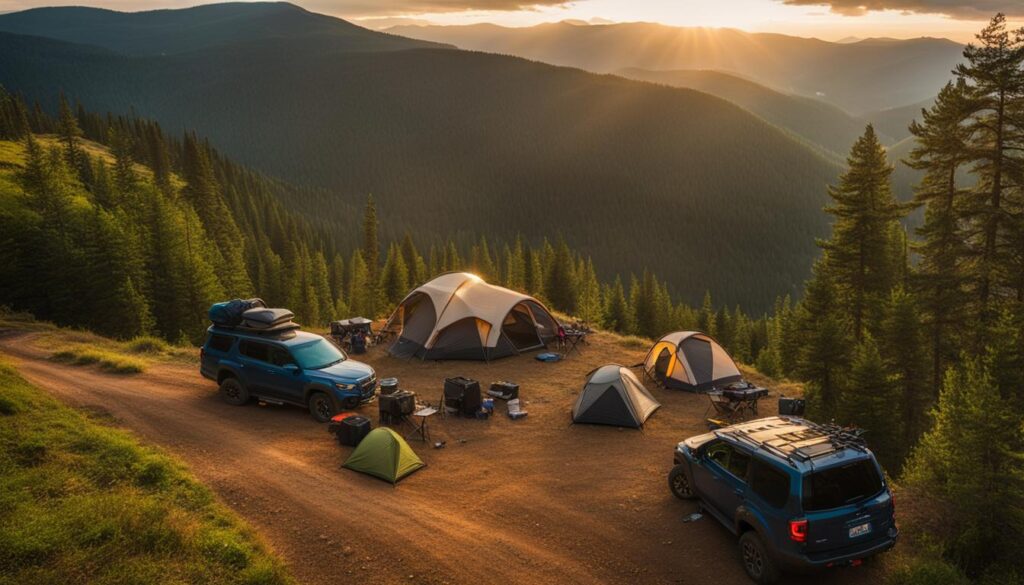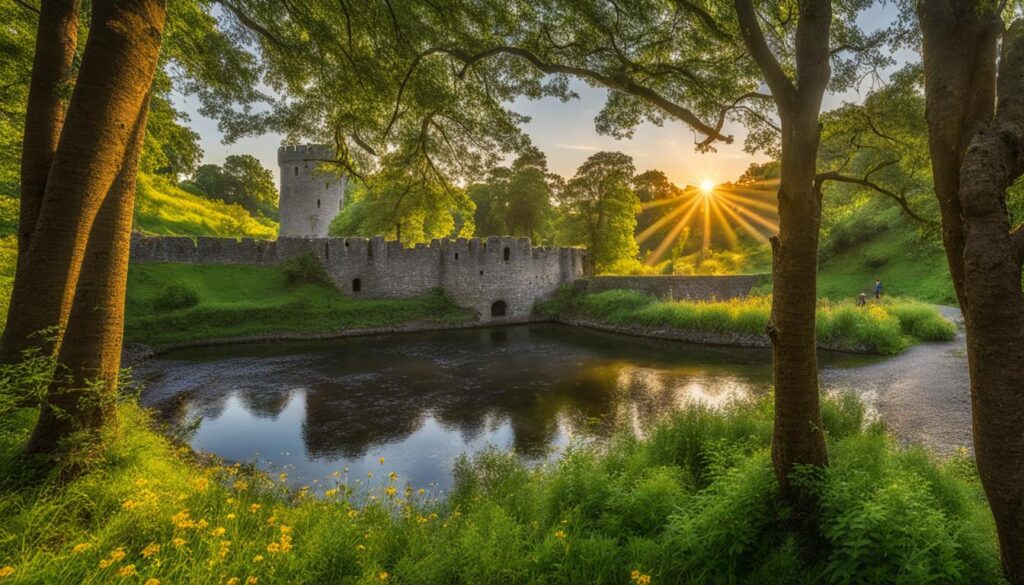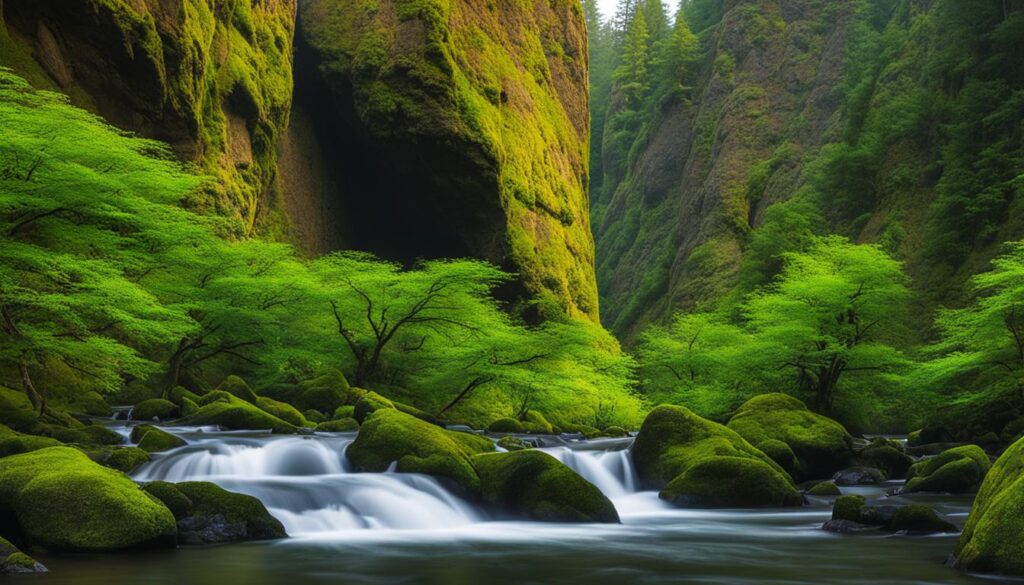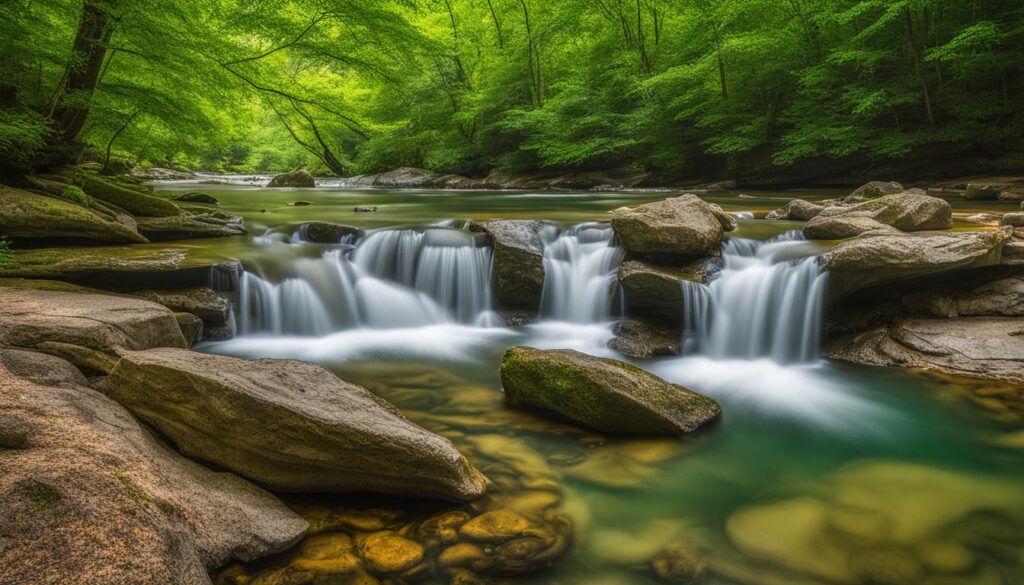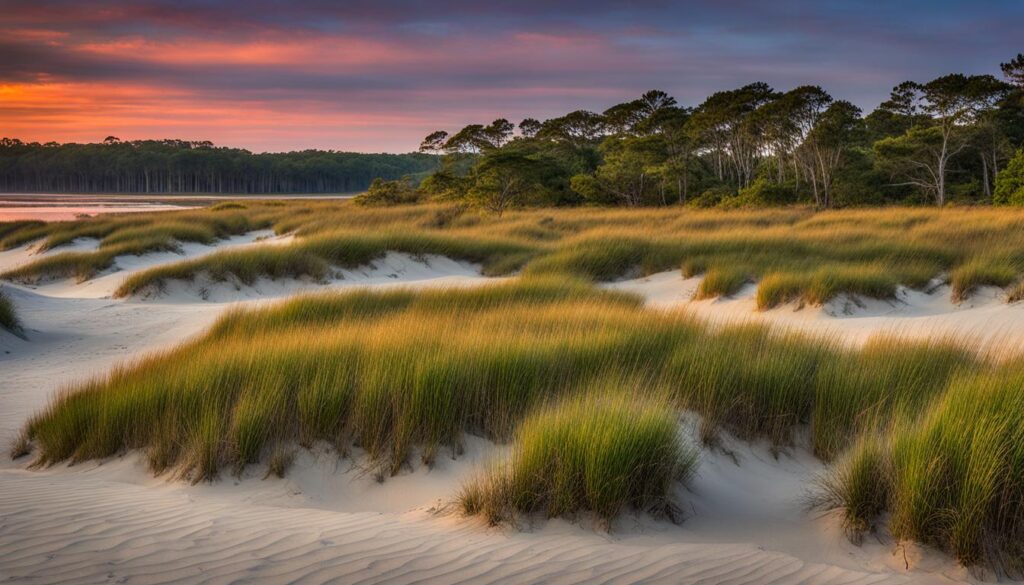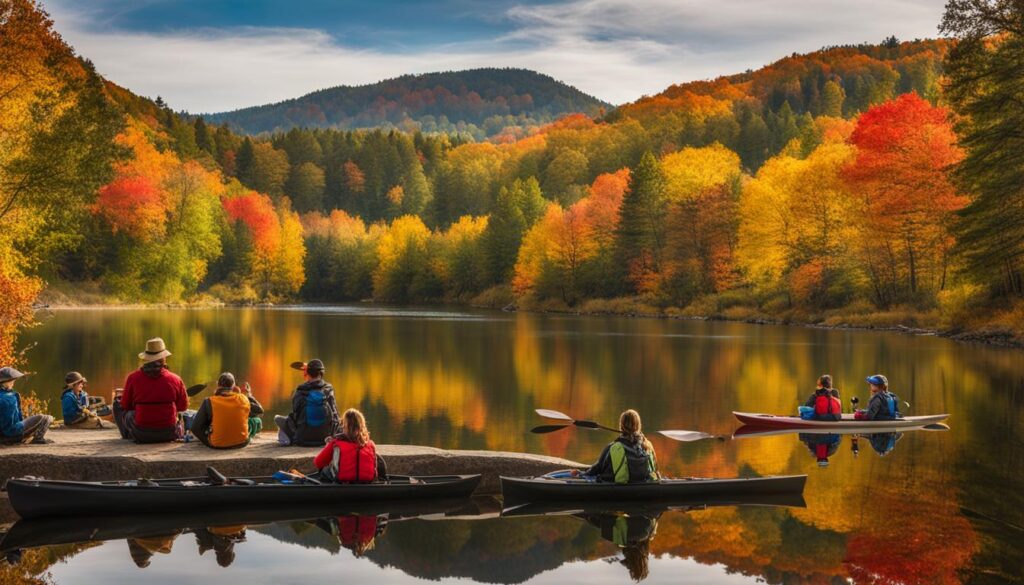When it comes to embracing the beauty of the great outdoors, overland camping offers a truly immersive and adventurous experience. Overlanding is a form of self-reliant adventure travel where individuals explore and discover remote wilderness areas by traveling in a 4-wheel drive vehicle and camping for extended periods.
Imagine disconnecting from the hustle and bustle of city life and reconnecting with nature in its purest form. Overland camping provides the perfect opportunity to combine the freedom of the open road with the thrill of exploring remote locations. It’s a chance to explore hidden gems, indulge in breathtaking vistas, and embark on unforgettable journeys.
Whether you’re seeking solitude, looking to bond with family and friends, or simply yearning for an adrenaline-fueled adventure, overland camping allows you to create lasting memories and discover the wonders of the natural world.
Key Takeaways:
- Overland camping involves self-reliant adventure travel in remote wilderness areas.
- It combines the thrill of exploration with the freedom of the open road.
- Overland camping allows individuals to disconnect from city life and reconnect with nature.
- It offers the opportunity to create lasting memories and discover hidden gems.
- Overland camping is an adventurous and immersive way to experience the great outdoors.
Contents
- 1 Why Overlanding is Becoming More Popular
- 2 Choosing a 4-wheel Drive Vehicle for Overlanding
- 3 Carrying all Necessary Supplies
- 4 Camping in Remote Locations
- 5 Exploring Wilderness Areas and Off-road Trails
- 6 Understanding the Differences Between Overlanding and Camping
- 7 Ensuring Safety and Etiquette in Overland Camping
- 8 FAQ
- 9 Source Links
Why Overlanding is Becoming More Popular
Overlanding, a unique way to experience the great outdoors, has been growing in popularity. This surge can be attributed to several factors, including the increasing desire for adventure, the affordability of overland travel, and the appeal of having more control over one’s travel experiences. Overlanders are drawn to the opportunity to explore remote wilderness areas, disconnect from city life, and find peace and tranquility in nature.
Overlanding appeals to a wide range of people, from families looking for an unforgettable adventure to solo travelers seeking personal growth and self-discovery. Its flexibility allows individuals to create their own itineraries, uncover hidden gems, and follow their own paths. Unlike traditional camping, overlanding offers the freedom and flexibility to fully embrace the journey, not just the destination.
Many overlanders are also drawn to the excitement and sense of accomplishment that comes with off-roading and exploring challenging terrains. It offers a chance to test one’s skills, push boundaries, and conquer obstacles while being surrounded by breathtaking landscapes. Whether it’s crossing rivers, navigating through dense forests, or conquering steep mountain passes, the challenges of overlanding add an element of thrill and reward to the experience.
| Best Overland Camping Tips | Popular Overland Camping Destinations | Overland Camping vs Traditional Camping |
|---|---|---|
| 1. Plan and research your route beforehand | 1. Moab, Utah, USA | 1. Overlanding offers more freedom and flexibility compared to traditional camping |
| 2. Equip yourself with essential gear | 2. Baja California Peninsula, Mexico | 2. Overlanding allows you to explore remote wilderness areas |
| 3. Practice Leave No Trace principles | 3. Cape York Peninsula, Australia | 3. Overlanding appeals to a wide range of people, from families to solo travelers |
| 4. Be prepared for changing weather conditions | 4. Icelandic Highlands, Iceland | 4. Traditional camping focuses more on relaxation and enjoying the outdoors |
| 5. Connect with the local overlanding community | 5. Namib Desert, Namibia | 5. Overlanding allows individuals to have more control over their travel experiences |
As overlanding continues to gain popularity, more and more people are embracing this adventurous approach to camping. Its unique combination of exploration, self-reliance, and connection with nature makes it an appealing choice for those looking to escape the ordinary and experience the extraordinary.
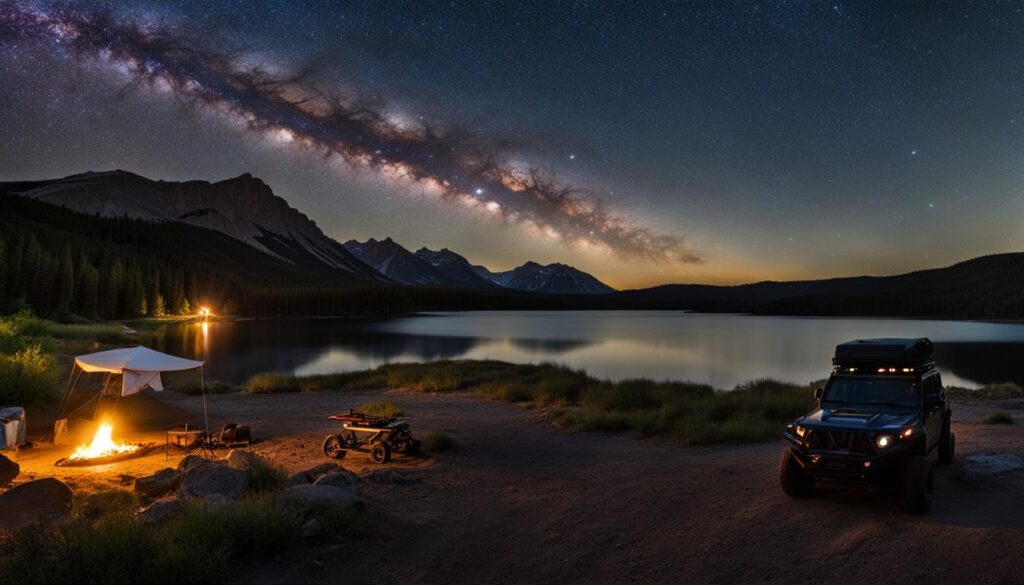
Choosing a 4-wheel Drive Vehicle for Overlanding
When it comes to overlanding, having the right 4-wheel drive vehicle is crucial. Your vehicle will be your home, your transportation, and your lifeline in remote areas. Therefore, it’s essential to choose a vehicle that can handle the challenges of off-road travel and provide the necessary space and reliability for an extended camping adventure.
When considering a 4-wheel drive vehicle for overlanding, there are several factors to take into account:
- Off-road capabilities: Look for a vehicle with good ground clearance, a sturdy suspension system, and a reliable drivetrain that can handle rough terrains.
- Reliability: Opt for a vehicle known for its durability and dependability. You don’t want to be stranded in the middle of nowhere due to mechanical issues.
- Towing capacity: If you plan on towing a trailer or carrying additional gear, make sure your vehicle has sufficient towing capacity to handle the load.
- Fuel economy: Long journeys require ample fuel efficiency. Choose a vehicle that strikes a balance between power and fuel economy to optimize your travel experience.
Once you’ve selected the right vehicle, it’s important to equip it with the essential gear for overland camping. Outfitting your vehicle with the proper accessories will enhance your camping experience and ensure your safety and comfort on the road.
Essential Gear for Overland Camping
To make the most of your overlanding adventure, make sure to have the following items in your overland camping equipment checklist:
- Tent: Choose a reliable, weather-resistant tent that provides enough space for your camping needs.
- Sleeping bags and sleeping pads: Invest in quality sleeping bags and comfortable sleeping pads for a good night’s sleep.
- Camping stove and cookware: Pack a portable camping stove, cooking utensils, and lightweight cookware to prepare meals on the go.
- Refrigerator or cooler: Keep your food fresh and drinks cold with a refrigerator or cooler designed for camping.
- Navigation and communication devices: GPS, maps, and a reliable communication device are essential for staying on track and ensuring your safety.
- Recovery equipment: Carry recovery gear such as tow straps, shackles, and a winch to handle any off-road challenges.
- First aid kit: Be prepared for any injuries or emergencies with a well-stocked first aid kit.
- Clothing and personal items: Pack appropriate clothing for various weather conditions, along with personal hygiene items and toiletries.
By having the right vehicle and essential gear, you’ll be equipped for self-sufficient travel in remote areas, ensuring a memorable and safe overland camping experience.
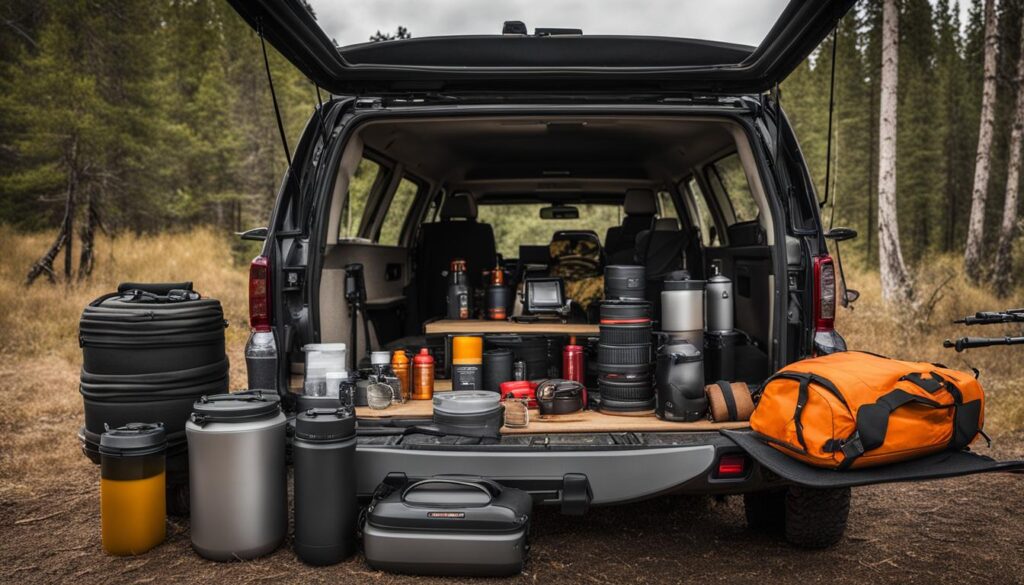
| Essential Gear | Description |
|---|---|
| Tent | A reliable, weather-resistant tent for shelter during camping. |
| Sleeping bags and sleeping pads | Quality sleeping bags and comfortable sleeping pads for a good night’s sleep. |
| Camping stove and cookware | Portable stove, cooking utensils, and lightweight cookware for preparing meals. |
| Refrigerator or cooler | Refrigerator or cooler to keep food fresh and drinks cold. |
| Navigation and communication devices | GPS, maps, and communication devices for navigation and staying connected. |
| Recovery equipment | Tow straps, shackles, and winch for handling off-road challenges. |
| First aid kit | Well-stocked first aid kit for emergencies and injuries. |
| Clothing and personal items | Appropriate clothing, personal hygiene items, and toiletries. |
Carrying all Necessary Supplies
As an overlander, it’s crucial to be fully prepared with all the necessary supplies to ensure a safe and enjoyable camping experience in remote areas. From food and water to camping gear and communication equipment, having a well-planned inventory is essential for self-sufficiency.
Food and Water
When packing for your overland camping trip, include non-perishable food items that are easy to store and prepare. Items such as canned goods, dried fruits, nuts, and energy bars are lightweight and provide long-lasting sustenance. Additionally, don’t forget to carry a reliable water filtration system or purification tablets to ensure a safe drinking water supply.
Camping Gear
Having the right camping gear is essential for a comfortable stay in remote locations. Be sure to pack a sturdy tent, sleeping bags, and sleeping pads to provide a good night’s sleep. Additionally, consider bringing a portable camping stove for cooking meals, and don’t forget utensils, cookware, and plates for eating.
Navigation and Communication Equipment
When venturing into the wilderness, it’s crucial to have the necessary navigation and communication equipment. Bring a GPS device or a reliable map and compass for accurate navigation, especially in unfamiliar territories. Additionally, ensure you have a reliable communication device, such as a satellite phone or a two-way radio, for emergencies or staying connected with your group.
Recovery Equipment
When off-roading in remote areas, it’s important to be prepared for any unexpected situations. Carry recovery equipment like a proper jack, tow straps, an air compressor, and a shovel to assist with any vehicle-related challenges you may encounter along the way.
First Aid Kits
Your overland camping checklist should include a comprehensive first aid kit. Ensure it is well-stocked with essential medical supplies, including bandages, antiseptic ointment, pain relievers, and any necessary prescription medications. Be prepared to handle minor injuries or provide initial treatment until further medical assistance is available.
Clothing and Personal Items
When packing for your overland camping trip, make sure to bring appropriate clothing for various weather conditions. Layering is key to adapt to temperature changes throughout the day. Don’t forget essentials like sturdy footwear, hats, sunglasses, and sunscreen for sun protection. Additionally, pack personal items such as toiletries, towels, and any necessary medications.
Carrying all the necessary supplies ensures that you can enjoy the freedom and adventure of overland camping while being self-sufficient in remote areas. Proper planning and preparation ensure a safe and enjoyable experience that allows you to fully immerse yourself in the beauty of nature.
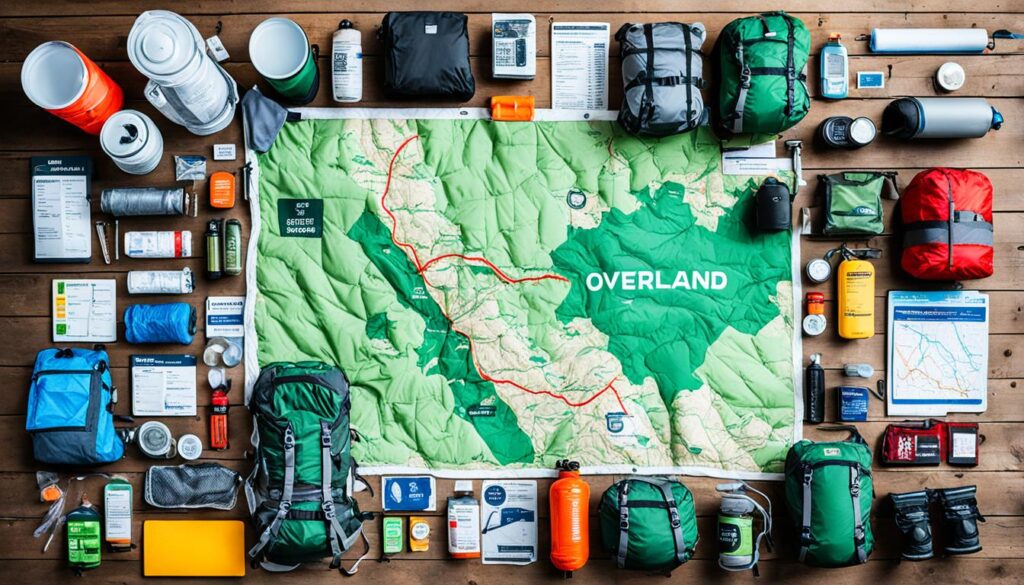
Camping in Remote Locations
When it comes to overland camping, one of the biggest draws is the opportunity to camp in remote and breathtaking locations. From vast deserts to towering mountains and pristine wilderness areas, there are countless destinations to choose from. Whether you’re seeking solitude, untouched beauty, or a sense of adventure, these popular overland camping destinations offer something for every nature enthusiast.
Top Overland Camping Destinations
| Destination | Description |
|---|---|
| Moab, Utah | A natural playground for outdoor enthusiasts, Moab offers stunning red rock landscapes, world-class off-road trails, and iconic national parks like Arches and Canyonlands. |
| Denali National Park, Alaska | Home to North America’s tallest peak, Denali National Park boasts breathtaking vistas, diverse wildlife, and unparalleled opportunities for hiking, fishing, and wildlife spotting. |
| Big Bend National Park, Texas | Located along the Rio Grande, Big Bend National Park showcases dramatic canyons, expansive desert landscapes, and a rich diversity of plant and animal life. |
| White Mountains, New Hampshire | With its picturesque hiking trails, crystal-clear lakes, and charming campgrounds, the White Mountains offer a perfect blend of natural beauty and outdoor recreation. |
| Banff National Park, Canada | Renowned for its majestic landscapes, turquoise glacial lakes, and rugged mountain peaks, Banff National Park is a paradise for outdoor enthusiasts and nature photographers. |
Exploring these popular overland camping destinations requires careful planning and preparation. It’s important to have the best overland camping tips in mind to make the most of your adventure. Be sure to research local regulations, pack all the essential gear, and follow Leave No Trace principles to minimize your impact on the environment. Additionally, having a reliable means of communication, such as a satellite phone or two-way radio, can provide peace of mind in case of emergencies.
Exploring Wilderness Areas and Off-road Trails
Overlanding offers a thrilling and unique way to explore the great outdoors, allowing individuals to venture into wilderness areas and tackle off-road trails. Whether you’re seeking breathtaking mountain vistas, vast deserts, or serene wilderness, overland camping opens doors to some of the most popular destinations for outdoor enthusiasts.
When embarking on an overland adventure, it’s crucial to be well-equipped with the right gear to navigate these remote areas safely. A reliable four-wheel drive vehicle is a must, along with essential tools such as a GPS, maps, compass, and communication devices. These tools not only provide guidance but also ensure that you have the means to communicate and call for help if needed.
Top Overland Camping Spots
Here are some of the top overland camping spots that offer stunning landscapes and thrilling off-road trails:
- Moab, Utah: Known for its iconic red rock formations and the famous Moab Jeep Safari, Moab is a mecca for overland adventurers.
- Big Bend National Park, Texas: With its rugged terrain, scenic drives, and diverse wildlife, Big Bend is a paradise for overlanders seeking exploration and solitude.
- Death Valley National Park, California: This vast desert park offers otherworldly landscapes, challenging off-road trails, and mesmerizing starry skies.
- Denali National Park, Alaska: For those seeking an ultimate wilderness experience, Denali National Park’s remote roads and rugged landscapes provide an unforgettable overlanding adventure.
Whether you’re a seasoned overlander or just starting your journey, these destinations offer a mix of breathtaking scenery, challenging terrains, and camping opportunities that will leave you in awe.
Understanding the Differences Between Overlanding and Camping
When it comes to enjoying nature, there are different ways to embark on an outdoor adventure. Overlanding and camping offer unique experiences, each with its own focus and atmosphere. To help you choose the right adventure for your preferences, let’s explore the differences between overlanding and traditional camping.
Overlanding is all about self-reliance, exploration, and the journey itself. It involves long journeys in remote locations, often across diverse terrains. Overlanders seek to disconnect from city life and immerse themselves in the great outdoors. It’s a chance to challenge oneself, push boundaries, and embrace the unknown.
On the other hand, traditional camping is more focused on relaxation and enjoying the outdoors. It usually involves shorter getaways to established campgrounds or recreational areas. Camping allows you to unwind, enjoy nature’s beauty, and rejuvenate your mind and body.
While both overlanding and camping provide opportunities to connect with nature, they cater to different desires and goals. Overlanding enthusiasts thrive on the excitement of self-sufficiency, off-road adventures, and the thrill of exploring uncharted territories. Campers, on the other hand, enjoy a more laid-back experience, where they can unwind, indulge in outdoor activities, and spend quality time with family and friends.
Overlanding focuses on self-reliance, exploration, and the journey itself, while camping is about relaxation and enjoying the outdoors.
If you crave the adrenaline rush of embarking on long journeys into remote locations and love the idea of testing your limits, overlanding might be your calling. On the other hand, if you prefer a more leisurely experience, setting up camp in designated areas, and simply unwinding in nature’s embrace, traditional camping will suit your preferences.
When choosing the right adventure, consider your goals, comfort level, and the type of experience you seek. Whether you’re drawn to the thrill of overlanding or the tranquility of camping, there’s no denying the joy and fulfillment that await you in the great outdoors.
Ensuring Safety and Etiquette in Overland Camping
When it comes to overland camping, safety and etiquette should always be top priorities. Respecting the environment, wildlife, and fellow campers is crucial to maintaining a positive experience for everyone involved. By practicing the Leave No Trace principles, staying on designated trails, and being mindful of noise levels, we can preserve the beauty of our natural surroundings while enjoying the serenity of overland camping.
Being prepared with the necessary gear is an essential part of responsible overland camping. From having a reliable 4-wheel drive vehicle to carrying a comprehensive overland camping essentials checklist, such as navigation tools, communication devices, and first aid kits, being properly equipped ensures self-sufficiency and safety while exploring remote areas.
Choosing the top overland camping spots is another important aspect of the experience. By selecting destinations that align with your interests and skill level, you can maximize your enjoyment while minimizing the impact on the environment. Whether you’re seeking breathtaking mountain vistas, challenging off-road trails, or tranquil desert landscapes, there are plenty of diverse options to fulfill your overland camping desires.
Remember, overland camping is not just about the destination but also the journey itself. By following safety protocols, respecting nature, and being considerate of others, we can create a sustainable and enjoyable overland camping experience for all enthusiasts. So, pack your gear and hit the road to explore the wonders of the great outdoors through overland camping!
FAQ
What is overland camping?
Overland camping is a type of self-reliant adventure travel where individuals explore remote wilderness areas by traveling in a 4-wheel drive vehicle and camping for extended periods. It combines the freedom of the open road with the thrill of exploring remote locations.
Why is overlanding becoming more popular?
Overlanding is growing in popularity due to the desire for adventure, the increasing affordability of overland travel, and the need for more control over travel experiences. It offers the opportunity to explore remote wilderness areas, disconnect from city life, and find peace and tranquility in the great outdoors.
How do I choose a 4-wheel drive vehicle for overlanding?
When choosing a 4-wheel drive vehicle for overlanding, consider factors such as off-road capabilities, reliability, towing capacity, and fuel economy. Outfit your vehicle with additional accessories like roof racks, winches, and off-road tires to enhance its capabilities.
What supplies do I need for overland camping?
Overland campers need to carry their own supplies, including food, water, camping gear, navigation and communication equipment, recovery equipment, first aid kits, clothing, and personal items. Plan meals, bring non-perishable food items, and have a way to purify water to ensure self-sufficiency while traveling in remote areas.
Where can I camp during overland camping?
Overland camping provides the opportunity to camp in remote locations such as deserts, mountains, and wilderness areas. Be prepared with the right gear, including a tent, sleeping bags, sleeping pads, and a camping stove. Follow Leave No Trace principles and be mindful of potential hazards and any camping regulations.
What can I explore during overland camping?
Overlanding allows individuals to explore wilderness areas and off-road trails, providing a unique and adventurous way to experience the great outdoors. Be prepared with the right gear and prioritize safety while exploring remote areas, including having a reliable vehicle, GPS, maps, compass, and communication devices.
What are the differences between overlanding and traditional camping?
Overlanding focuses on self-reliance, exploration, and the journey itself, while traditional camping is about relaxation and enjoying the outdoors. Overlanding involves long journeys in remote locations, while camping is often a short getaway. Understanding the differences helps individuals choose the adventure that suits their preferences.
How can I ensure safety and etiquette during overland camping?
Safety and etiquette are paramount in overland camping. Respect nature, wildlife, and other campers. Practice Leave No Trace principles, stay on designated trails, and be mindful of noise levels. Be prepared with necessary gear, practice proper navigation, and prioritize safety measures for a positive overland camping experience.
